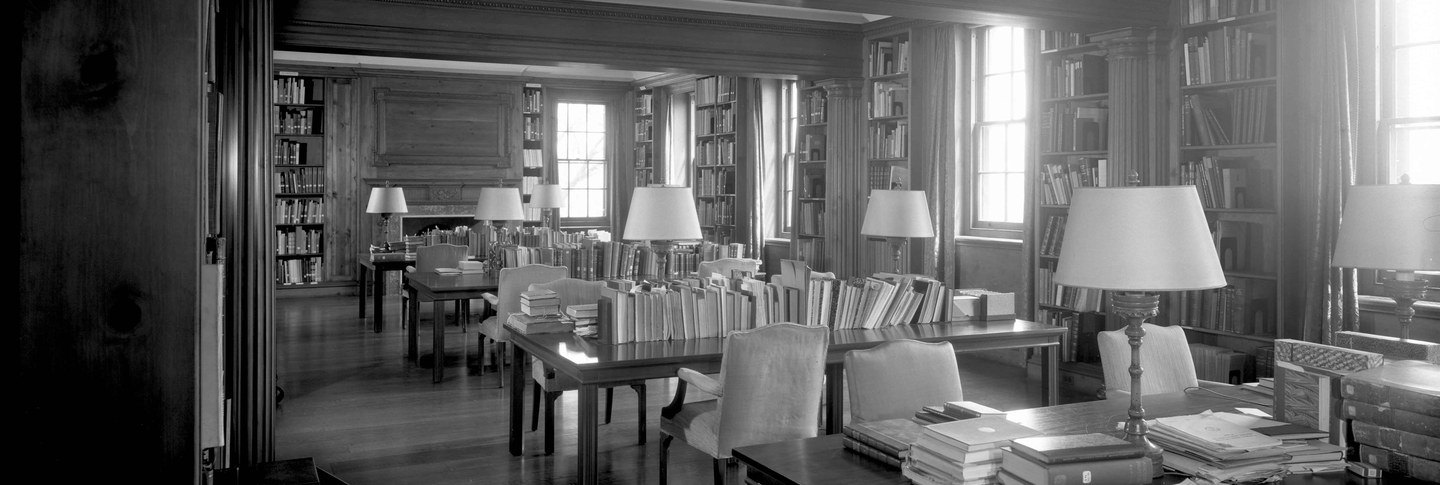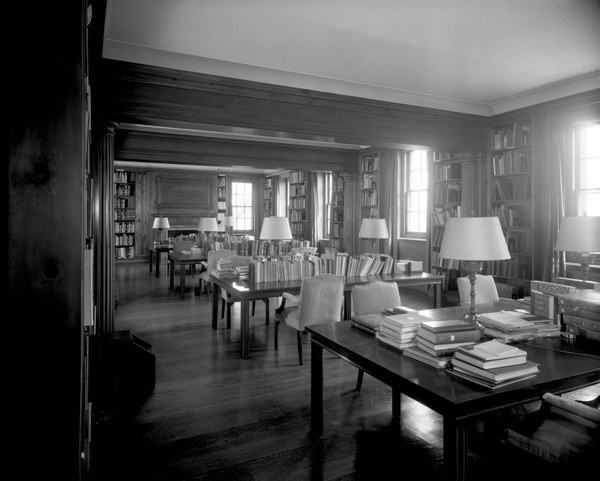
Byzantine Reading Room designed by Thomas T. Waterman, 1941, using two former bedrooms on the second floor of the Main House.
Mildred and Robert Woods Bliss’s gift of Dumbarton Oaks to Harvard University in November 1940 included two recently constructed exhibition and library pavilions which were to be the functional center of the new research institution. The Blisses envisioned that the Main House, however, would remain a residence and provide housing for senior scholars and distinguished guests as well as spaces for teas, dinners, and receptions. The house would continue to be managed by a live-in staff of six who had their own living quarters, including bedrooms, a communal kitchen, and a staff dining hall.
By May 1941, it was clear that this arrangement was not going to work. The library had already outgrown the space originally provided for it, and scholars and fellows needed more office space in which to do their work. In a letter dated May 20, 1941 and preserved in the Dumbarton Oaks Archives, director John Thacher wrote Mildred Bliss, who was in California:
What would you think of conceiving of the main house as a whole as the Dumbarton Oaks Research Library? This would seem to me to give added dignity to the library and would stress even more the importance of the library and research activities. It would mean giving up actual living in the house and having all the servants live out and making the six servants’ rooms on the second floor into individual study rooms for the fellows – a space for which they are constantly clamoring. Such a change, it seems to me, would put the emphasis very definitely on the importance of the Research Library and the research activities.
Thacher envisioned housing the ever-expanding library as well as the necessary library staff offices in the Blisses’ former bedrooms and guest rooms on the second floor. On May 27, 1941, he wrote a similar letter to Paul Sachs, Chairman of the Dumbarton Oaks Administrative Committee:
The important thing at this time to decide is whether, in principle, you and the Committee would be sympathetic with the idea of visualizing the main part of the house as the Library. I hasten to say, however, that as I see it, the music room, the oval room, the present library [Study] and the drawing room [Founders Room] would remain unchanged, but it would mean that the service end of the house, as well as the second floor bedrooms, would be completely altered. Therefore, the house would cease to exist as a domicile. As I have dreamt about the possibilities resulting from such a change, I can see both a permanent solution to our Library and Museum problems, as well as giving to the whole institution added dignity and seriousness of purpose.
Predictably, the Blisses were opposed at first to Thacher’s suggestion, although they eventually came to see the wisdom of his plan. On May 27, Mildred Bliss wrote Thacher:
. . . it will save on housekeeping expenses, of course, but lose an important imponderable: it is the Home of the Humanities and not merely a brick building holding books. Either it will be a Day Institution with no sleeping or eating and second-rate servants coming in from the rain to dust the first floor rooms and running out, ill-humoured, to meals. Or it can keep a few beds, a kitchen and a few (3 perhaps or 4) good servants.
Perhaps the Blisses’ opinion of altering the main house from a domicile to a research library was changed by a night letter sent to them on June 2 by their long-time friend, Beatrix Farrand, the designer of the Dumbarton Oaks Gardens and a frequent resident at Dumbarton Oaks:
After talk with Thacher feel deeply happy as alterations suggested will give needed working library and study space and leave beauty of library [Study] and drawing room [Founders Room] and music room unimpaired. Heartily approve wisdom of making new library the heart of establishment. Hate to see our bedrooms go but believe solution farsighted and in Oakly spirit. Trix.

